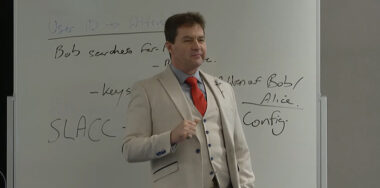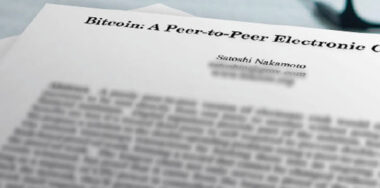The English Court of Appeal heard argument Thursday that the trial judge in Dr. Craig Wright’s successful libel action against blogger Peter McCormack was not legally entitled to reduce the damages awarded in the case.
In a 2022 trial, Dr. Wright had successfully proven that McCormack had caused serious harm to Dr. Wright’s reputation in the United Kingdom in relation to a number of social media posts and a video in which McCormack accused Dr. Wright of fraudulently claiming to be Satoshi Nakamoto. McCormack did not argue that his statements were true, which would have afforded him a full defence if accepted by the court. As a result, the court found that McCormack was liable to Dr. Wright for defamation.
However, the trial judge reduced the damages available to Dr. Wright to just £1 to reflect an argument Dr. Wright abandoned before trial that McCormack’s statements had caused him to be disinvited to a series of conferences; McCormack’s lawyers later introduced evidence which cast doubt over whether this had happened.
On Thursday afternoon, heavy-hitting barrister Lord David Wolfson KC appeared in arguing Dr. Wright’s appeal told the court that this litigation misconduct by a claimant—even where that includes dishonesty—is not a basis to reduce general damages in law.
“Litigation misconduct can never be a reason, in my respectful submission, to reduce general damages—except, obviously, to exclude the effect of the exaggeration of the general damages.”
Dr. Wright never advanced the allegedly dishonest argument on the conferences, so there was no exaggeration of any damage on Dr. Wright’s part. In fact, the judge expressly said that in his judgment but for the conference evidence, he would have awarded ‘substantial’ damages to Dr. Wright.
However, Catrin Evans QC for McCormack argued that the judge was entitled to reduce the damages because the purpose of general damages is to reflect the harm actually suffered. What the judge was effectively determining, she argued, was that Dr. Wright litigation misconduct meant that there was no reputation capable of being damaged.
Lord Justice Singh expressed scepticism over this position:
“If, for example, somebody was accused of being a murderer or anti-semitic, and they’re found in the trial to have lied about something else, is it necessarily the case that it means they have no reputation at all to protect?”
This is something Lord Wolfson KC homed in on in his earlier arguments, where he said that the alleged ‘dishonesty litigation misconduct’ perpetrated by Dr. Wright is of an entirely different character than the libel which McCormack had been proven to have inflicted upon him:
“When one is talking about dishonesty, I do submit respectfully there is all the difference in the world between a libel saying you’re dishonest about something which goes to who you are, and whether you’ve lied to your spouse about an affair, or lied about a speeding ticket or even lied to the court about overseas conferences. My primary submission is that we don’t’ get into this area at all, but if we do we certainly don’t get into it to the extent damages are reduced to £1.”
Another difficulty with the trial judge’s decision to reduce the damages on the basis of the supposed dishonest litigation misconduct is a conceptual one: Dr. Wright successfully made out his case on defamation, meaning he established that his reputation had been seriously harmed. How could the damages then be reduced on the basis of ‘misconduct’ by Dr. Wright which only ever took place before trial? The Lord Justices identified this difficulty:
“It’s not consistent with the general approach to the law of torts, because its predicated on the assumption that there is some harm caused which would otherwise be compensated for but because you’re a bad person, we’re not going to compensate you for it.”
This point was echoed by Lord Wolfson KC in his closing submissions:
“We won on serious harm. It is a little difficult at one and the same time to say ‘the claimant won on serious harm’ but at the same time say ‘the claimant has no reputation at all.’”
“In the judgment, the reason we were knocked out on damages is not because we didn’t have a reputation, it’s because we would have got substantial damages because we did win on serious harm, we did have a reputation to be compensated for or vindicated, but ‘we behaved so badly we got a ban.’”
There is some authority, however, that judges reviewing civil claims do have the power to take action after a claimant has already won a trial and reduce damages to reflect litigation misconduct. Lord Justice Singh, sitting on the court of appeal, asked why it can’t be the case that a judge can reduce damages to £1 after a successful trial when there is judicial commentary in other cases which suggests the court can strike out a claim entirely in the case of litigation misconduct.
Lord Wolfson KC said that this judicial commentary posited that striking out a claim was a possible step a Judge could take in the very worst case of misconduct—but that such ‘worst cases’ would be ‘one in a billion’ and that the mere potential for a greater remedy cannot be used to justify a lesser one.
He also pointed to the conceptual difference between the court denying somebody the right to a judgment from the court—as would happen in the case of a strike-out—and the court finding the claimant is entitled to £50,000 but is only entitled to £23,000.
Lord Wolfson KC had some time at the end of the hearing to reply to Evans KC’s arguments, and he repeated what appears to be at the core of why the parties were in court today in the first place:
“The libel in this case was not just that [Dr. Wright] told a common and garden lie. It’s hard to express for my client just how personal this lie is. It goes to the heart of his being—that he is lying about being Satoshi Nakamoto. That is the most serious of defamatory claims: it’s a matter of profound biographical significant to him and when, after many years, my client passes on, whether he invented Bitcoin is likely to be the first line in any obituary.”
The appeal hearing took just the one day, but it involved subtle legal nuances which there appear to be at least some conflicting judicial authority on, so any decision from the court of appeal may take time.
However, whatever the appeal judges decide there was a sense from the lawyers making arguments that this is a contentious enough legal issue that it could end up in the Supreme Court (it wouldn’t be the first time Dr. Wright’s litigation has gone on to set legal precedent)—so no matter the ultimate outcome of Thursday’s hearing, we might not have seen the end of Wright v McCormack.
New to blockchain? Check out CoinGeek’s Blockchain for Beginners section, the ultimate resource guide to learn more about blockchain technology.









